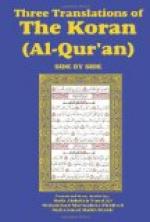18 Or, entrusted, i.e. with the office of apostle.
19 Saleh-according to Bochart, the Peleg of Gen. xi. 16. D’Herbelot, B. O. 740, makes him the Schelah of Gen. xi. 13. See v. 63, n. and p. 220, n.
20 It is just possible that the act of Koleib, chief of the Banu Taghlib tribe, in killing the milch camel of Basûs, a female relative of his wife of Bani-Bakr lineage-which led to a forty years’ war between these two tribes, A.D. 490-may have been worked up by Muhammad into this account of the persecutions of Saleh.
21 See Sura xxiv. 176, p. 109.
22 This verse may contain an implied reference to the famine with which Mecca had been visited, and fix the date of this part of the Sura. Comp. verse 127.
23 Lit. plot, stratagem.
24 Comp. the passage from Pirke R. Eliezer, c. 48, who makes Moses perform this miracle in the presence of Pharaoh, which the Scripture (Ex. vii.) account does not. The Muhammadan tradition is that Moses was a black.
25 Lit. cause him to hope, temporise with him.
26 Lit. male ominati sunt. Mar. They traced their calamities to Moses. So Sale. Kas. But Ullmann. renders, they attributed their misfortunes to the predictions of Moses.
27 In Suras [lxvii.] xvii. and [lxviii.] Muhammad speaks of nine plagues. The flood is not mentioned in the Scripture.
28 Lit. when we removed from them the plague until a period at which they should arrive.
29 Lit. that in which these are.
30 Lit. the set time of his Lord was fulfilled in forty nights.
31 Sale and others render having a body, corporeal, of which the commentators give no satisfactory explanation. I have adopted that given by Freytag in v. That the calf lowed in consequence of Samal having entered into it, is one of the traditions of the Talmud. Pirke R. Eliezer, c. 45.
32 Compare Sura [lxxxi.] xxix. 47, [xciv.] lxxii. 2, [xci.] ii. 73. The word ummyy is derived from ummah, a nation, and means Gentile; it here refers to Muhammad’s ignorance, previous to the revelation of Islam, of the ancient Scriptures. It is equivalent to the Gr. laic, ethnic, and to the term gojim, as applied by the Jews to those unacquainted with the Scriptures. There can, however, be no doubt that Muhammad-in spite of his assertions to the contrary, with the view of proving his inspiration-was well acquainted with the Bible histories. He wished to appear ignorant in order to raise the elegance of the Koran into a miracle. For the passages of Scripture said to foretel Muhammad, see Pocock’s Sp. Hist. Ar. p. 188, ed. White.
33 If these words, as Nöldeke supposes, contain an allusion to the Ansars, it is likely that this verse was added at Medina. The epithet Al-Ummy (the unlettered) does not, thus, occur in Meccan Suras.
34 The Koran.
35 Pirke R. Eliezer, 45, explains Ex. xxxii. 26, of the tribe of Levi, as not having been implicated with the other tribes in the sin of the golden calf.




